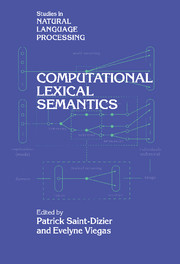Book contents
- Frontmatter
- Contents
- List of contributors
- Preface
- 1 An introduction to lexical semantics from a linguistic and a psycholinguistic perspective
- Part I Psycholinguistics for lexical semantics
- Part II Foundational issues in lexical semantics
- Part III Lexical databases
- Part IV Lexical semantics and artificial intelligence
- Part V Applications
- Part VI Computer models for lexical semantics
- Author index
- Subject index
Part III - Lexical databases
Published online by Cambridge University Press: 29 September 2009
- Frontmatter
- Contents
- List of contributors
- Preface
- 1 An introduction to lexical semantics from a linguistic and a psycholinguistic perspective
- Part I Psycholinguistics for lexical semantics
- Part II Foundational issues in lexical semantics
- Part III Lexical databases
- Part IV Lexical semantics and artificial intelligence
- Part V Applications
- Part VI Computer models for lexical semantics
- Author index
- Subject index
Summary
Another current major issue in lexical semantics is the definition and the construction of real-size lexical databases that will be used by parsers and generators in conjunction with a grammatical system. Word meaning, terminological knowledge representation and extraction of knowledge in machine readable dictionaries are the main topics addressed. They really represent the backbone of a lexical semantics knowledge base construction.
The first chapter, “Lexical semantics and terminological knowledge representation” by Gerrit Burkert, shows the practical and formal inadequacies of semantic networks for representing knowledge, and the advantages of using a term subsumption language. In a first stage, this document shows how several aspects of word meaning can be adequately described using a term subsumption language. Then, some extensions are proposed that make the system more suitable for lexical semantics. Formal aspects are strongly motivated by several examples borrowed from an in-depth study of terminological knowledge extraction, which is a rather challenging area for lexical semantics.
“Word meaning between lexical and conceptual structure”, by Peter Gerstl, presents a method and a system to introduce world-knowledge or domain-dependent knowledge in a lexicon. The meaning of a word is derived from general lexical information on the one hand and from ontological knowledge on the other hand. The notion of semantic scope is explored on an empirical basis by analyzing in a systematic way the influences involved in natural language expressions. This component has been integrated into the Lilog system developed at IBM Stuttgart.
- Type
- Chapter
- Information
- Computational Lexical Semantics , pp. 163 - 164Publisher: Cambridge University PressPrint publication year: 1995

